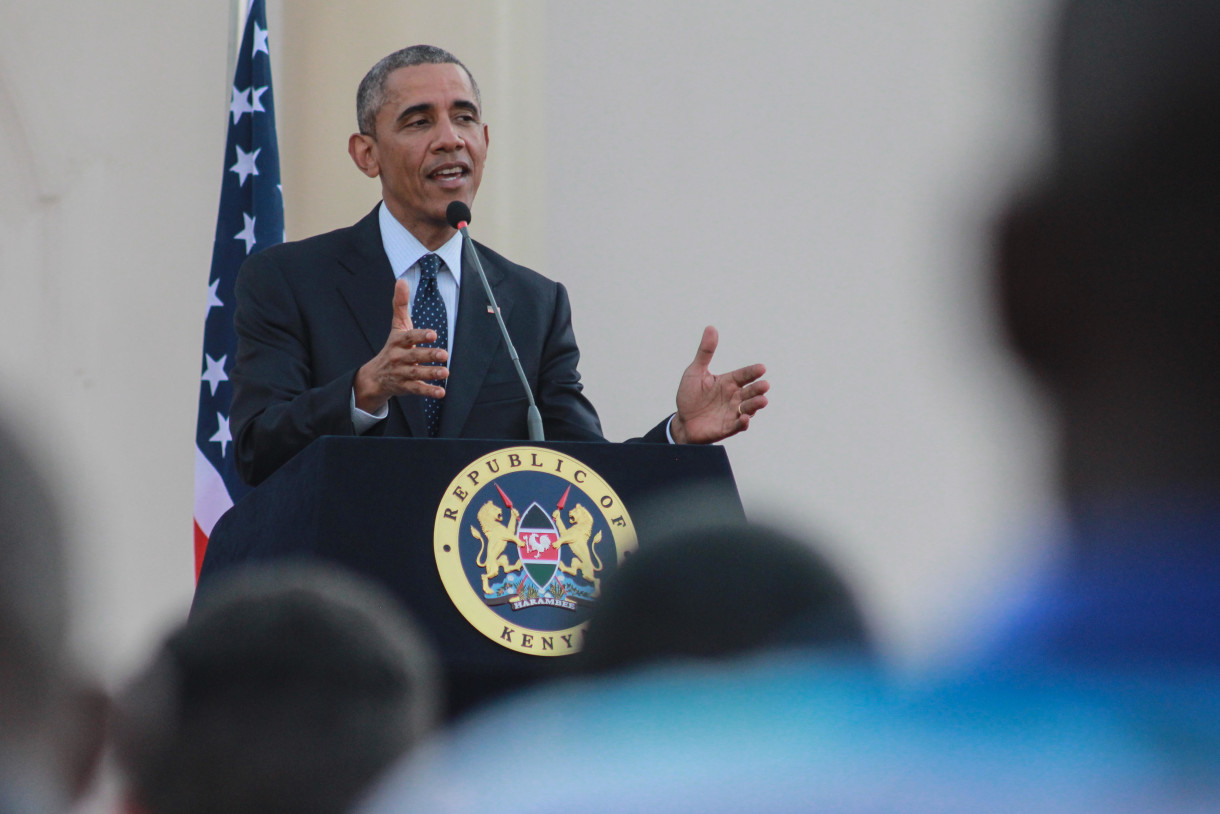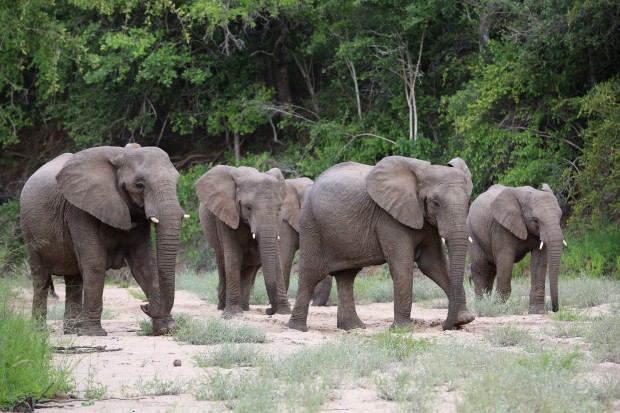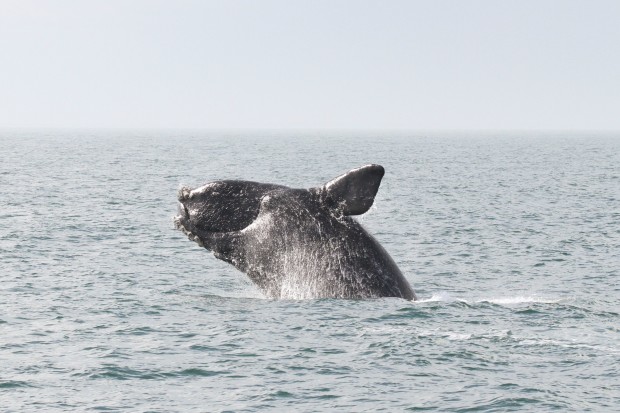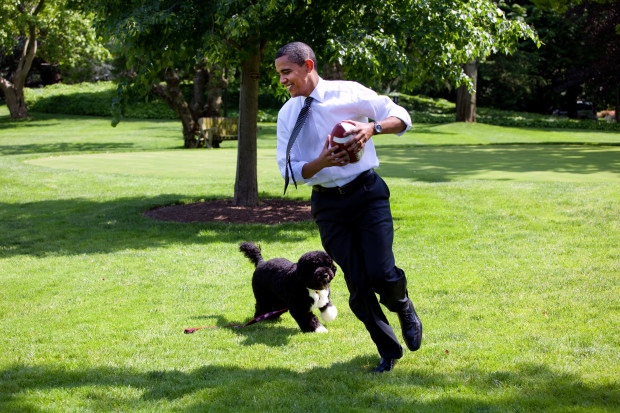My Exclusive Interview, on Wildlife Protection, With President Barack Obama

At a press conference in Kenya last year, President Barack Obama announced that the United States will take urgently needed steps to curtail wildlife trafficking and address the elephant poaching crisis. Photo by Alamy
We’ve been working with President Barack Obama and a number of his cabinet secretaries and executive agency staff on a wide range of animal welfare policies during the last seven years — from preventing horse slaughter plants from opening up to halting the slaughter of downer calves to ending the use of government-owned chimpanzees in invasive experiments. Today is World Wildlife Day, and it’s an opportunity for us to turn our attention to the numerous threats facing wild animals around the globe. Wildlife protection has been a very active area of collaboration for us and the White House, on everything from combating the poaching of elephants and rhinos to protecting right whales along the Atlantic coast to stopping the trophy hunting of African lions to ending commercial fishing practices harmful to sea turtles and dolphins to seeking greater protections for polar bears exploited in the international commercial trade. I had the privilege and opportunity to ask President Obama about what he considers some of his top accomplishments in protecting wildlife, and this interview represents one of the fullest expressions of his views that’s been published anywhere on his wildlife protection ethic.
Q: What do you see as the most important steps you’ve taken in the area of animal protection?
Let me say this first – every step I’ve taken to protect our environment and our wildlife is a personal one for me. I grew up in Hawaii, known for its iconic natural beauty. Needless to say, I spent a lot of time exploring outdoors. It was hard not to learn very early just how easy it is to appreciate – and how hard it can be to protect – the incredible splendor that nature provides us. When I was 11, I had never been to the mainland, and my grandmother, my mother, and my two-year-old sister and I decided to take a big summer trip across the continental U.S. I still remember traveling up to Yellowstone National Park, coming over a hill, and suddenly seeing just hundreds of deer and bison for the very first time. That new scenery gave me a sense of just how immense, how diverse, and how important the vast array of wildlife is to understanding and appreciating the world and our place in it. That’s something I wanted my daughters to understand when I brought them back to the very same spot at Yellowstone a few years ago. And it’s something I want to preserve for our kids, grandkids, and generations to come.
That’s why I’ve taken every opportunity in my time in office to protect the world’s wildlife where I can. We’ve negotiated the highest-standard trade agreement in history that will provide new tools to protect wildlife. We’re leading the world in protecting exploited species of sharks. We’re substantially reducing government research on chimpanzees and providing protection for all chimpanzees in the wild and captivity. And we’re taking new action to recover monarch butterflies and other pollinators and expanding protection and restoration efforts for endangered species here in the United States.
To address the ongoing scourge of poaching that is threatening the existence of species like the elephant and the rhino, I issued an Executive Order about three years ago that directed all agencies of the federal government to work together as a presidential task force to protect these important animals. We’ve also pursued successful efforts to conserve an iconic bird—the greater sage grouse—across 11 western states. It’s the largest planning effort to protect a species in U.S. history, illustrating how a strong national, state, and private collaboration and flexible and effective programs can protect wildlife, benefit the environment and enhance local economies across the country.

“We currently face the risk of losing wild elephants during my lifetime.” President Obama says. “It’d be an unpardonable loss for humanity and the natural world. There’s no question: we need to take urgent action to save one of the planet’s most majestic species.” Photo by iStockphoto
Q: Text from the Environment Chapter of the recently concluded Trans-Pacific Partnership (TPP) reflects a strong commitment to protecting wildlife. Would you explain how this agreement will combat wildlife trafficking and strengthen international commitments and actions?
This is an important point that I don’t think many people realize about this trade agreement. The TPP puts in place the toughest environmental protections of any trade agreement in history, and they’re targeted to address some of the greatest environmental threats in the Asia-Pacific. After all, the TPP will impact one of the world’s most ecologically diverse regions and includes countries with the greatest demand for illegal wildlife products.
The TPP is packed with fully-enforceable provisions that I’m confident will be effective new tools to curb illegal logging, combat illegal fishing, and protect iconic species like the rhino and the lesser-known – but highly-trafficked – pangolin. Whether poached in Kenya or taken from a protected forest in Vietnam—countries have committed to take action under the TPP to combat wildlife trafficking, regardless of where the poaching originally took place. Countries have also agreed to increase international cooperation and information sharing in pursuit of traffickers, and to implement strong anti-corruption protections to get at bribery and money-laundering and other illegal activities that are often at the root of illegal trafficking schemes. If these measures are found to be ineffective, or a country isn’t upholding its conservation laws—we can bring a formal dispute proceeding, and if we win, we can use trade sanctions against the losing country to help compel their compliance with these rules.
While you might not normally think of a trade deal as a likely avenue for this, the TPP may be one of the most potent tools we have to protect wildlife around the world. We can’t afford to delay such tools and a chance to make real progress, which is why I am doing everything I can to secure them before I leave office.
You can read the entire environmental chapter in TPP for yourself here.
Q: At a recent peak in poaching of elephants, it was estimated that one elephant was killed in Africa every 20 minutes – with much of the killing conducted by militias who turn tusks into cash and are intent on destabilizing nations and looting them of their resources. How has your Administration helped protect the African elephant?
We currently face the risk of losing wild elephants during my lifetime. It’s an unbelievable statement. It’d be an unpardonable loss for humanity and the natural world. There’s no question: we need to take urgent action to save one of the planet’s most majestic species and address the security threat posed by insurgency groups and dangerous criminal networks whose trade in ivory and other resources funds their activities.
We have proposed a near-complete ban on the import and domestic sale of elephant ivory that will shut down domestic markets for illegal ivory, making it harder for criminals to profit from poaching. We have also put new resources into aggressively expanding international enforcement efforts, training prosecutors, and other efforts to stop criminal organizations around the world from making a profit through poaching. In September, we negotiated a similar commitment with President Xi Jinping of China, which is the largest market in the world for illegal ivory. China will also put in place a near-complete ban on domestic commercial trade and the U.S. and China will work together on joint training, technical exchanges, and law enforcement efforts to combat wildlife trafficking. We are providing significant funding and technical assistance through agencies like the U.S. Fish and Wildlife Service, the State Department, and USAID to range countries in Africa to support elephant conservation and anti-poaching efforts. Secretary Kerry, Secretary Jewell, and I have all separately visited Africa in the past 12 months, and we have each highlighted our grave concerns about poaching. During these trips we announced numerous new programs that assist African countries in strengthening conservation efforts, building law enforcement capabilities related to illegal trafficking, and enhancing cooperation between African countries to reduce ivory trade across international borders.
More broadly, our Task Force on Combating Wildlife Trafficking is working to combat illegal trafficking of all wildlife species by strengthening global law enforcement cooperation, educating consumers here and around the world to reduce demand for illegally-traded wildlife, and building partnerships with governments, civil society, and businesses.
I won’t let up on any action or any step I can take to help protect the wild elephants. The world, and the wonder it affords, would be immeasurably dimmed if we fail.

Today, the Obama Administration will move forward with regulations that will enhance the protection of marine mammals like whales and seals here and around the world. Photo by the Georgia Department of Natural Resources
Q: There is an urgent need to enhance protection of marine mammals like whales, dolphins, polar bears, and sea turtles – many of which are endangered – that are under threat from increased commercial fishing, illegal, unregulated and unreported fishing, and loss of marine habitat. What tools is the Administration using to address this issue?
Protecting our oceans is a top priority for me and my Administration. We hosted the first-ever Our Oceans conference in 2014 and established a Presidential Task Force that is using a whole-of-government approach to combat illegal fishing, a practice that is devastating our precious ocean resources and undermining legitimate fishermen everywhere. In 2014, I expanded the Pacific Remote Islands National Monument, creating the largest marine monument in the world, making it off-limits to development. Today, I am moving forward with regulations that will enhance the protection of marine mammals like whales and seals here and around the world.
But we can also use the power of markets to promote conservation of our resources. As I noted before, the TPP will give us new tools to enhance protections of threatened marine species from harmful fishing practices and illegal fishing—with commitments to promote sustainable management of their fisheries, reduce the amount of species that are unintentionally caught, and promote the long-term conservation of sharks, sea turtles, seabirds, and marine mammals like whales and polar bears. Under the TPP, countries are also on the hook to prevent and address marine pollution from ships which harm coastal and marine environments at the expense of beachgoers, fishermen, and ocean life at all levels of the food chain, from barnacles to blue whales.
Q: Are there any other wildlife issues — problems of exploitation — that stir you and you wish you could see turned around?
There’s long been tension between those who’ve sought to protect our wildlife and conserve our natural resources for the benefit of future generations, and those who have sought to profit off of those resources. To me, that’s always been a false choice. We can be smart about the clean, sustainable policies we pursue that will protect the wildlife and beauty we cherish while helping our economy grow.
So six weeks after I took office, I decided to restore vital protections for wildlife that face extinction. For more than thirty years, the Endangered Species Act has successfully protected our nation’s most threatened wildlife, and we should always be looking for ways to protect them, not make them more vulnerable. That’s a tenet I’ve lived by since day one of my presidency.
Today, we can say that we’ve made unprecedented progress restoring once-declining wildlife populations in the United States and recovering animals that were once endangered. It’s a good moment when you see species coming off the endangered list. Animals like the humpback whale and the Louisiana black bear are on the mend. Those bears are big! And while I wouldn’t want to tangle with one, I’m glad my kids and grandkids will have the chance to see them in action. Other beloved animals like Florida’s manatee and California’s condor have made stunning comebacks from the brink of extinction. Once-rare plants, fish, and other species, like the New England cottontail, are regaining their strength in numbers, too.
But our planet is still facing an extinction crisis. My Administration has made it a priority to continue to find solutions that will reverse the course we’re on, using every tool available to protect our natural resources for future generations. I’m working on delivering as many victories on this front as possible, permanently protecting more public land and water than any of my predecessors. And I’ll continue to work with states, private landowners, and other crucial partners around the world on behalf of the most vulnerable wildlife. After all, they are the living, breathing reflections of the world we hope to preserve for future generations. As stewards of the Earth, it will take all of us to make sure we live up to that responsibility.
So, thank you for your passion and dedication to that stewardship. Your vigilance has helped make the progress we’ve made together possible. When I no longer hold this office, I will be right there next to you in the role of citizen, doing what I can alongside you to help build and protect the world we’re fighting for.



Why has the Obama administration failed to protect wolves, and other predators, from reckless state policies which are aimed at near extermination of these vital animals? Spread of disease, including Chronic Wasting Disease, can be linked to foolish pro-hunting policies which place high game take by hunters above healthy eco-systems and humane treatment of wild animals. Why has the pro-hunting bias of USFWS instigated in the Bush administration not been corrected? We need modern, sane eco-system protection.
I agree with you’re statement unfortunately the laws this term or year has only benefitted the hunters and fisherman ,,and only caused more use of guns and killing and illegal trade ,if only president Obama could convince the asia -pacific ,trade policies to endorse a reform policy by the Asian presidents to stop the dogmeat trade which is such a loophole that Asian men getaway with a legal issue stealing pets ,using dogs for food ,which is also listed against the laws ,and the act of murder ,. this should be dealt with and reversed .
Heartwarming and promising. Thank you.
You should have asked about the effect on wildlife of Obama’s wars.
I really appreciate your position and read everything you write. I want to tell you Thank you for all the efforts you make. It’s kind of sad that this is the only interview that has been done on such a huge and important issue. There should be journalists everywhere squeezing interviews out of every possible influential person.
I am so happy that you are leading the pack on wildlife.
Thank you,
Kitty
Love from Europe Thank you
Mr. President, You did not address part of the first question which should concern you as President of the United States.
You were asked what steps you have taken in the area of animal protection. You addressed wildlife, completely leaving out the bloody revolution which is happening across the United States. The cruel practices which prevail in factory farms which slaughter terrified animals with mindless brutality, having, from the time of birth, largely kept them in horribly inhumane squalor,
You probably have been advised to read about these barbarian practices, and see films showing these cruel acts. You are our President. Speak out for the animals here in your country.
I agree completely with Juditha — the president’s interest in wildlife is great, but his neglect/ignorance of the brutality “farm” animals endure is really unforgivable — it always upsets me when, for Thanksgiving, he jokingly “pardons” a turkey —saying at one time (paraphrasing) “I would really have liked to eat you instead…”
His wife, with all her great work on gardening and getting youngsters to eat more vegetable, never once, to my knowledge, has addressed the horror farm animals live in and the need to stop eating meat, for the animals sake and for our own health.
One wonders, how much $$ the industry contributed to his elections. How much lobbying influence the industry has on his administration.
How to get his attention? Wayne Pacelle: When are you going to talk with him about the plight of our farm animals??
I agree, the only talk was of wildlife. He didn’t address anything about the abuse of animals in this country from dog fighting to pets to even animal testing in this country. I have always cared more for animal charities than human ones because animals are so looked over or just not considered important. We have come along way but need to strive for more improvement in all aspects that affect animals from pets to wildlife to research/ testing to humane treatment of animals for consumption.
It did talk about stopping the use of Chimps in testing. I agree about dog fighting, it’s terrible and needs to be stopped. Animals cruelty needs to be treated with harsher punishments. But saying the POTUS should tell people not to eat meat in. Country of millions of meat eaters? Really?
It’s a shame that, owing to there being innumerable World This Days and World That Days (almost all completely trivial), World Wildlife Day — to-day, according to Mr. Pacelle’s article — has passed totally unremarked.
Shame Mr. Pacelle didn’t ask about apex predators within the contiguous states, particularly wolves and big cats. Still … every journey begins with a single step.
What ever you might think of Mr. Obama, it’s nice to have a president capable of forming complete and intelligible sentences!
ΠΞ
Stop the scourge stop the trade in live animals ,stop all ivory trade .leaders lead by example stop tho carnage .
Stop all trophy hunting .Stop the live trade ,and stop all trade in ivory.leaders lead by example
Well nothing about the USDA wildlife misservices. Sorry obama, you’re a washout. Easy to worry about animals in other countries. Should start with your own. PS…how do you think animals get endangered? Because nobody cared until they were.
Yeah, because the president has all the time in the world to devote to every little thing we’d like to see done. They;re important but smaller issues, what with wars all over the world, terrorist attacks, and shootings all over and people asking him to do something about that and others fighting his every move; Putrin posturing over Ukraine, and now Syria, North Korea playing with rockets; China taking over the south China Seas; racial violence cropping back up in America. Gees, give he man a small break. He seems pretty passionate about working on as much as he could, he made a lot of parks too. He’s one man with a heck of a lot on his plate and Critics that expected him to be superman.
Trish, you are write! Yet, we all want our issues handled don’t we?
I would be happy ug Wildlife Services were defunded, and if all predators were protected. We really need them to fight wildlife diseases.
He cares even more than he expresses I believe. I thank you Wayne! I loved that last paragraph especially. Kudos to you for all you do!!!
I too wish that the problems facing our American wildlife had been discussed. Our top predators— wolves, bears and coyotes, are being slaughtered at an alarming rate. And it was interesting to read Obama’s comments about Yellowstone, just as Park Rangers are preparing to slaughter hundreds of bison for no valid reason. There are so many animal issues right here at home—fur farms, factory farms, puppy mills,the sadistic and inhumane “tradition” of trapping which needs to be banned, and many more.These issues are no less or more urgent than many other global animal crises. It all goes to show how desperately we need to support the HSUS and all other animal advocacy groups working to save and improve lives of animals around the world.
How is Obama ad HSUS helping our declining wild horses and burros?
There is no comment or questions asked about the animals in the U.S that are facing extinction.
Bureau of land Management has over 60,000 thousand wild horse’s in holding facilities. Their are many politicians and livestock ranchers would like to see these horse’s shipped to slaughter in Mexico and Canada. These horse’s are American Icons and part of our American history.
The Bureau of land Management wants to spay and neuter horse’s that are still on the range.
Spay and neuter means extinction.
What about the Wolves in Idaho that are being gunned down with Rifles from helicopters and others that being hunted down and killed.
What about the 700 to 900 hundred Buffalo that are being killed and slaughtered in Yellowstone and surrounding areas.
What about them . They did nothing wrong to deserve a death sentence.
Obama mentioned nothing about them.
This is happening in his own country the he is the President of this nation.
I think its a disgrace.
And let us not forget that our taxes are paying the Bureau of Land Management to kill all those animals: from the wild horses & burros, to the wolves, coyotes & foxes, to the bison in Yellowstone Park. Obama said the manatees are making a come-back, but I just read this morning that over 30,000 have died in the last several years. They need help now — more than ever! And I sure wish Michelle Obama would try to encourage the country into eating more vegetables and spare the farm factory animals from the nasty ways they’re slaughtered. So many of the slaughterhouses have sadistic workers. It’s all too sad for the animals.
I would like to see your last act in office would be to stop all ROUND UPS AND SLAUGHTER in the USA ON THE WILD MUSTANGS AND THE ONES IN HOLDING PIN TO BE RELEASED BACK INTO THE WILD WHERE THE WERE ROUNDED UP, AS OF RIGHT NOW THERE BEING STARVED AND NO WATER ,AND THIS IS COSTING THE TAXES PRAYERS MILLIONS, AND THE KILLING OF WOLVES . EVERYTHING WORKS TOGETHER ON THIS PLANET,AND WHEN YOU TRY TO CHANGE NATURE,YOU DESTROY IT,DO YOU REALLY WHAT ALL LIFE TO END ? WE AS THE CARETAKERS OF THIS EARTH NEED TO STOP AND SEE THE BIG PICTURE. ANIMALS ARE HERE FOR A REASON JUST LIKE YOU AND EVERYONE ELSE IS, PLEASE STOP ALL ROUND UPS AND THE SHIPPING OF OUR WILD HORSE TO SLAUGHTER OVER OUR BOARDERS TO CANADA AND MEXICO,AND THE EXPORT ON SHIPS.
LOVE
I agree with other commenters here regarding the wildlife massacres and slaughter taking place right in OUR OWN BACKYARD. Wolves, Bison, Coyotes, Prairie Dogs and the list goes on. Mr. President I know you have the world on your plate to contend with but you also have a phone in your office. call that useless hack you appointed Tom Vilsack and ORDER HIM to put as stop to all these wildlife killing policies. it should take no more than five minutes of your time. on behalf of the wildlife in America , thank you.
As counterpunch.org has written this is a puff piece allowing obama to promote his ruinous trade bill the TPP that essentially cedes national sovereignty to a corporate tribunal. Despite the liberal pretensions obama has proven over and over to be little more than a corporate puppet. Next in line for the democrats the corrupt and odious hrc….
I’m going to rethink my annual contribution to the HSUS.
http://www.counterpunch.org/2016/05/19/the-humane-society-and-the-greenwashing-of-the-tpip/
Every time that I start feeling warm about the HSUS it does something unforgivable. This time it is its support of the TPP. The TPP is not even really a trade pact. It is in fact a treaty. It has very little to do with trade and a great deal to do with corporate immunity for any and all wrong and hurtful acts. It would prove to be a devastating Bill for the average person and for the natural world. Positioning yourself as a friend of this Bill is truly making a deal with the devil.
HSUS should immediately reconsider this allegiance.